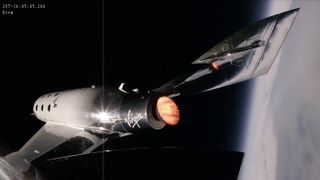
Virgin Galactic's suborbital space plane VSS Unity just soared to new heights, and you can go along for the ride, thanks to a new video.
Unity aced its third-ever rocket-powered test flight yesterday (July 26), reaching a maximum altitude of 170,800 feet (52,060 meters) and a top speed of Mach 2.47. (Mach 1 is the speed of sound, about 767 mph, or 1,235 km/h, at sea level.)
Neither Unity nor its predecessor, VSS Enterprise, had ever gone so high before, Virgin Galactic representatives said. [Virgin Galactic's VSS Unity Spaceliner in Pictures]
The newly released video compresses the flight into 2.5 visually stunning minutes. Viewers see Unity carried into the skies above the Mojave Air and Space Port in Southern California by the plane's WhiteKnightTwo mothership, which is called VMS Eve.
Unity began flying freely at an altitude of 46,500 feet (14,170 m), and the video captures the dramatic drop: The winged spacecraft falls away toward the Mojave Desert floor for a moment, before the plane's onboard rocket engine roars to life and blasts Unity onward and upward.
The space plane got high enough for pilots Dave Mackay and Mike "Sooch" Masucci — and all of us, vicariously — to see the curvature of Earth against the blackness of space.
"That is a million-dollar view out the window, Dave," Masucci said in the video, which also features in-cockpit shots of the two pilots operating the vehicle.
Get the Space.com Newsletter
Breaking space news, the latest updates on rocket launches, skywatching events and more!
Mackay and Masucci soon steered Unity safely home; the video ends with the space plane touching down at the Mojave Air and Space Port, as onlookers cheer the craft's return.
Unity is the second SpaceShipTwo vehicle, which Virgin Galactic is developing to take paying customers and scientific payloads on brief trips to suborbital space. The first edition, Enterprise, broke apart during an October 2014 test flight, killing co-pilot Michael Alsbury and wounding pilot Peter Siebold.
Unity's first two rocket-powered flights occurred in April and May of this year. If testing continues to go well, the space plane could begin commercial flights soon — perhaps even before the end of the year, Virgin Galactic founder Sir Richard Branson has said.
Hundreds of people have already booked a seat aboard the six-passenger spacecraft. Tickets currently sell for $250,000 apiece.
Follow Mike Wall on Twitter @michaeldwall and Google+. Follow us @Spacedotcom, Facebook or Google+. Originally published on Space.com.
Join our Space Forums to keep talking space on the latest missions, night sky and more! And if you have a news tip, correction or comment, let us know at: community@space.com.

Michael Wall is a Senior Space Writer with Space.com and joined the team in 2010. He primarily covers exoplanets, spaceflight and military space, but has been known to dabble in the space art beat. His book about the search for alien life, "Out There," was published on Nov. 13, 2018. Before becoming a science writer, Michael worked as a herpetologist and wildlife biologist. He has a Ph.D. in evolutionary biology from the University of Sydney, Australia, a bachelor's degree from the University of Arizona, and a graduate certificate in science writing from the University of California, Santa Cruz. To find out what his latest project is, you can follow Michael on Twitter.
